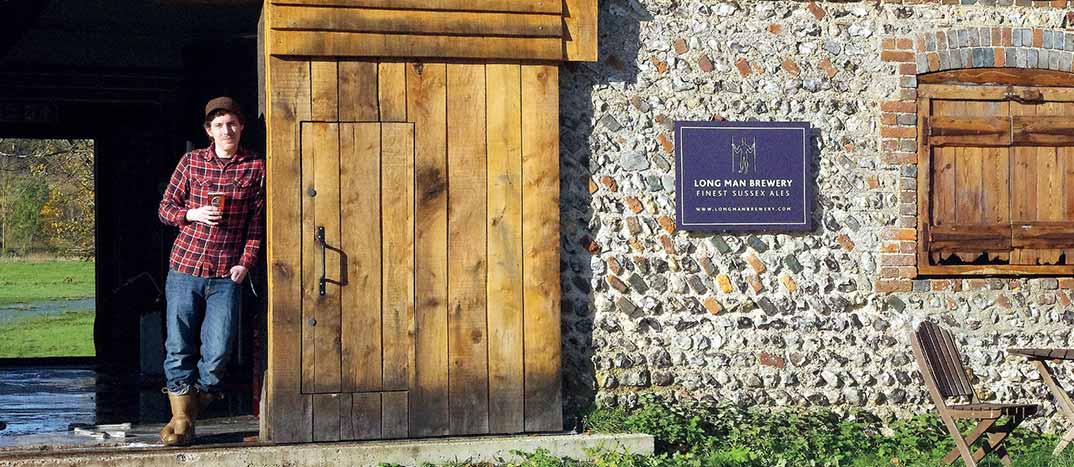Sales of craft beers in local pubs and restaurants are apparently booming and among the most popular are those from the Long Man Brewery – just down the road at Litlington in the Cuckmere Valley of East Sussex
If you’ve ever visited the South Downs, chances are you’ve spotted the iconic Long Man of Wilmington; at 226ft tall, the imposing image is cut into the steep slope of Windover Hill and remains a major local landmark, as well as one of the largest representations of a human figure anywhere in the world.
It’s from this famous monument that Long Man Brewery naturally takes its name. Founded in 2012 by locals Stephen Lees, Duncan Ellis and head brewer Jamie Simm, the award-winning hop house is based in the nearby village of Litlington in the Cuckmere Valley, at the heart of the South Downs National Park.
The Long Man headquarters can be found at Church Farm, where the Ellis family has been overseeing operations for three generations. And with Stephen and Jamie’s respective experience at beverage suppliers HT White and The Royal Tunbridge Wells Brewery, it has become one of the fastest growing breweries in the South East, where a love of all things local underpins each and every drop of its eclectic range of beers.
“Long Man employs in over ten people, the majority of whom live within the Cuckmere Valley; half of the team actually live within the village of Litlington,” says Jamie. “There’s a real passion for great beer and for the local community within the team, and a great calibre of committed staff in the area. East Sussex alone has in excess of 60 breweries, which shows the strength of the industry and the demand in the South East of England for great beers.”
Such demand stems from the brewery’s use of local ingredients to produce award-winning brews like the ‘seriously hopped’ American Pale Ale and the ever popular Long Blonde. Certainly, Long Man’s success is well-deserved, as the brewery strives to be as self-sufficient, sustainable and environmentally friendly as possible.
“Each beer we produce is the end result of not trying to reinvent the wheel, but rather to get back to basics and produce consistently high-quality, handcrafted, cask-conditioned bitter,” continues Jamie. “Our identity lies within our commitment to use the best and most locally sourced ingredients. Without a doubt, recipe formulation is the best part of the job. It perfectly reflects the blend of science and art required to work within this industry.”
In addition to using their own barley, which is grown on the downs overlooking Eastbourne, Stephen, Duncan and Jamie ensure that all waste products are used on the surrounding farmland, while waste water is channelled to irrigate crops and spent grain is used to feed livestock.
They’ve even ventured into more philanthropic ventures, helping to raise money for the Eastbourne Pier Benevolent Fund with their Craft Pier brew.
But it’s the locality of East Sussex that remains the star of the show, as a back-to-basics approach throughout the South East has seen breweries like Long Man come to the forefront of the region’s beer making industry, coinciding with punters’ penchants for no-nonsense, good quality ales. To that end, villages like Litlington have made their mark as go-to destinations for the real deal.
“In recent times there has been a perfect storm of increased demand, a desire for decent beer and a boredom about the mass-produced ‘wet air’ on offer,” Jamie says. “In an interesting turn, the British market is now starting to be increasingly influenced by the American craft scene, and for this reason, among others, the industry is starting to endorse both cask and keg beers.”
And the industry is starting to take note of smaller breweries, too, which have now become major players on the national pub circuit. Today, Long Man supplies more than 80 outlets throughout the UK and has won its tfair share of awards, including Europe’s Best Pale Ale at the World Beer Awards for its APA, and a recent Silver Medal at the International Beer Challenge for Long Blonde. Pretty impressive for any brewery, let alone one of such independent stature; but, as Jamie concludes, what it lacks in size it more than makes up for in versatility.
“Local brewers are perfectly placed to be close to the preferences of the local end consumer and understand their desires, while being agile enough to produce a range of beers and regular guests that cater for the tastes of the most demanding beer connoisseur.”








